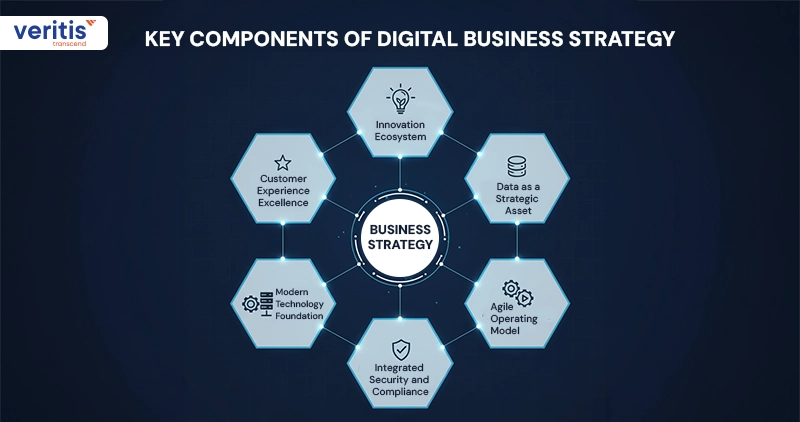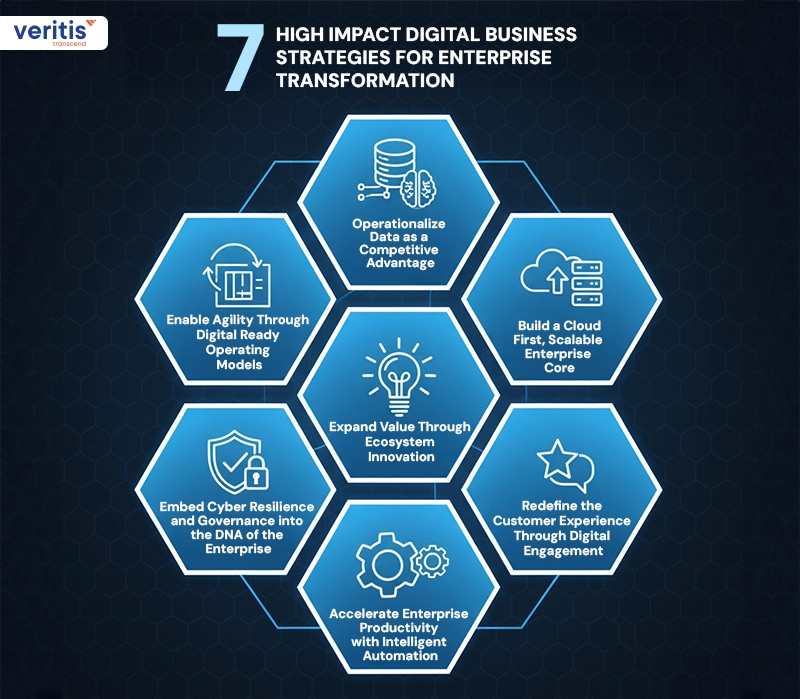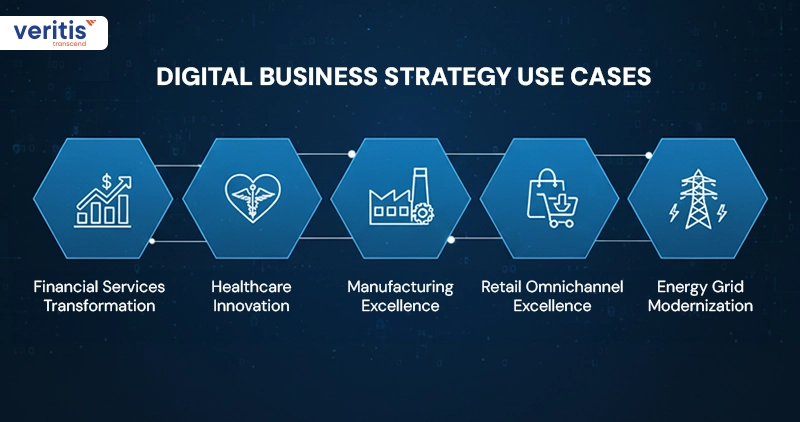
The boardroom falls silent. Your CFO presented quarterly results, and the numbers tell a story nobody wants to hear. Market share eroding. Customer acquisition costs are climbing. Your most promising competitor launched a platform that does in minutes what takes your organization weeks.
This is the moment executives realize the urgency of developing digital strategy that goes beyond surface level innovation. Enterprises that fail to implement a comprehensive digital business strategy risk irrelevance. Those that succeed explore unprecedented growth, efficiency, and market dominance.
The challenge? Building an effective digital transformation strategy is not about buying technology or hiring data scientists; it’s about understanding the underlying needs of your organization. It requires fundamentally rethinking how your enterprise creates, delivers, and captures value. This is where most organizations stumble, and where the right approach, guided by digital strategy consulting partners like Veritis, makes the difference between transformation and stagnation.
Get Your Digital Strategy Assessment
What is Digital Business Strategy?
A digital business strategy is your comprehensive blueprint for leveraging digital technologies, capabilities, and business models to achieve competitive advantage and drive sustainable growth. Unlike isolated IT initiatives, a robust digital business strategy integrates people, processes, technology, and data across your entire enterprise.
Think of developing digital strategy as architecting your organization’s future state. It encompasses customer experience, operational processes, business models, and organizational culture. When Veritis partners with enterprises on digital strategy development, we emphasize that this is fundamentally a business transformation that requires executive sponsorship, cross functional collaboration, and sustained commitment.
An effective enterprise digital strategy addresses critical dimensions. It defines how digital technologies enable new revenue streams. It establishes the roadmap for Enterprise Digital Transformation across all functions. It creates the foundation for continuous innovation in rapidly changing markets. This holistic approach to digital business transformation strategy ensures technology investments align directly with business outcomes.
The distinction between digital business strategy and traditional strategy lies in its digital first orientation. Every decision considers digital channels, data driven insights, and technology enabled capabilities as primary drivers. This represents a fundamental shift in how enterprises compete and operate in today’s economy.
Why Do You Need a Digital Business Strategy?
1) The Business Case is Compelling
Organizations with mature digital business strategies report 45% higher revenue growth compared to peers. They reduce operational costs by 30% through automation and process optimization. More critically, they achieve significantly higher customer satisfaction and retention by delivering seamless, personalized experiences.
2) Strategic Clarity in Uncertainty
An enterprise digital strategy provides alignment around a shared vision, prioritizes investments based on impact, and establishes clear metrics for progress. Without this framework, enterprises scatter resources across disconnected initiatives that fail to generate meaningful returns.
3) Competitive Imperative
Your customers live in a digital first world. They expect instant access, personalized interactions, and frictionless transactions. Meeting these expectations demands a comprehensive digital business transformation strategy that reimagines customer journeys, operational models, and value propositions.
4) Talent and Innovation
Top performers want to work for organizations at the forefront of innovation. A clear digital transformation strategy signals a commitment to the future, creating environments where talented professionals can thrive. Additionally, robust digital strategy services protect against cybersecurity vulnerabilities, compliance challenges, and operational disruptions.
Useful Link: Why Every CEO Needs an IT Strategy Roadmap for Digital Growth
Key Components of Digital Business Strategy

1) Innovation Ecosystem
The pace of change means enterprises cannot rely solely on internal capabilities. A comprehensive enterprise digital strategy encompasses partnerships, acquisitions, and ecosystem development, extending capabilities and accelerating innovation.
Working with a digital strategy company like Veritis provides access to broad ecosystem relationships and emerging technology expertise, ensuring your digital strategy development incorporates the latest innovations and best practices.
2) Data as a Strategic Asset
Data is the currency of the digital economy. A comprehensive digital transformation strategy establishes the architecture, governance, and capabilities to turn data into actionable insights and a competitive advantage. This includes modern data platforms, AI and machine learning models, and robust governance frameworks.
Developing digital strategy focused on data addresses infrastructure, quality, integration, and the cultural shift toward data driven decisions. Veritis ensures data becomes a strategic advantage rather than a compliance burden, with Business IT Alignment directly supporting business objectives.
3) Agile Operating Model
Technology alone doesn’t create transformation. You need new capabilities, skills, and ways of working. This includes agile delivery methodologies, cross functional teams, continuous learning cultures, and performance management aligned with digital objectives. The Digital Operating Model defines how work gets done.
Developing digital strategy here means reimagining organizational structures, breaking down silos, and empowering teams to innovate. Veritis designs operating models balancing standardization with flexibility, enabling efficiency and innovation simultaneously.
4) Integrated Security and Compliance
Digital expansion increases attack surfaces and regulatory complexity. A mature digital transformation strategy integrates security and compliance from the outset. This includes zero trust architectures, identity management, data privacy controls, and compliance automation.
Digital strategy services from Veritis incorporate security as a core component, ensuring initiatives meet regulatory requirements while protecting against evolving threats. This fosters trust with customers who are increasingly prioritizing data protection.
5) Modern Technology Foundation
Your technical backbone determines what’s possible in speed, scale, and innovation. Legacy systems constrain agility and increase costs. A forward looking enterprise digital strategy addresses infrastructure modernization, including cloud migration, microservices architecture, API first design, and DevOps practices.
Digital strategy implementation requires striking a balance between modernization and operational continuity. Veritis brings expertise in cloud technologies and enterprise architecture, helping you make intelligent decisions about what to migrate, modernize, or retire.
6) Customer Experience Excellence
Your digital business strategy begins with optimizing customer interactions across all touchpoints. This means creating seamless, personalized experiences that drive engagement, loyalty, and lifetime value. Veritis helps enterprises map customer journeys, identify friction points, and implement solutions that transform interactions from transactional to transformational.
Digital strategy development here encompasses omnichannel platforms, personalization engines, customer data platforms, and advanced analytics. The goal extends beyond satisfaction to creating advocates who amplify your brand.
Who Drives Digital Business Strategy?
1) The Executive Leadership Team
Your digital business transformation strategy requires active C-suite involvement. The CEO sets vision and allocates resources. The CIO translates requirements into technology solutions. The CDO orchestrates transformation initiatives. The CFO ensures appropriate returns.
These leaders must work as a unified team. Veritis emphasizes executive alignment as the foundation for success. Without it, even a brilliant digital transformation strategy fails due to competing priorities.
2) Business Unit Leaders
Digital strategy for business cannot succeed as a top down mandate. Leaders in sales, marketing, operations, supply chain, and HR must actively participate in developing digital strategy and drive adoption. They understand customer needs, operational constraints, and market dynamics shaping successful implementation.
3) IT and Digital Specialists
While digital business strategy extends beyond technology, IT and digital specialists provide essential expertise in feasibility, timelines, and risk mitigation. Veritis often augments internal teams with specialized skills in cloud platforms, data engineering, and cybersecurity, thereby accelerating the execution of digital transformation strategies.
4) Customers and Partners
The most effective digital business strategies incorporate direct input from customers and partners. Customer advisory boards, user research, and cocreation workshops ensure that digital strategy implementation delivers real value rather than solving nonexistent problems.
Useful Link: The Role of Digital Twin in Manufacturing With Benefits and Use Cases
Why Do Digital Business Strategies Fail?
1) Lack of Executive Alignment
When leadership teams lack consensus or lose enthusiasm as challenges emerge, digital business transformation strategy initiatives lose momentum. Veritis emphasizes governance structures, maintaining executive engagement throughout multiyear journeys.
2) Insufficient Change Management
Employees often resist new ways of working or lack the necessary training to adopt new systems. A successful digital transformation strategy dedicates substantial effort to communication, training, and aligning incentives.
3) Technology First Thinking
Organizations implement impressive solutions nobody uses. Effective digital strategy development begins with understanding business outcomes and customer needs and then identifying technologies that address those requirements.
4) Underestimating Complexity
Enterprise Digital Transformation involves intricate dependencies and legacy constraints. Experienced digital strategy consulting helps develop realistic roadmaps that sequence initiatives appropriately.
5) Weak Foundations
Organizations skip critical work on data quality, integration architecture, or security controls. Technical debt accumulates and collapses, requiring expensive remediation that proper digital strategy implementation could have avoided.
6) Poor Measurement
Without clear metrics and regular reviews, enterprises often fail to recognize problems early enough to course correct. A robust digital business strategy includes mechanisms for adjusting priorities based on results.
Digital Business Strategy vs Digital Transformation
| Dimension | Digital Business Strategy | Digital Transformation |
| Definition | Comprehensive plan defining how digital capabilities create competitive advantage | Execution of organizational change leveraging digital technologies |
| Scope | Strategic framework covering vision, objectives, priorities, and resource allocation | Tactical implementation of specific initiatives and programs |
| Time Horizon | Long term direction, three to five years | Ongoing process of continuous adaptation |
| Focus | What to achieve and why | How to accomplish specific objectives |
| Ownership | C-suite and board level governance | Cross functional teams and PMOs |
| Outputs | Strategic documents, roadmaps, investment theses, and success metrics | Implemented systems, changed processes, and introduced new capabilities |
| Flexibility | Relatively stable with periodic reviews | Highly adaptive with regular pivots |
| Measurement | Strategic KPIs for market position and growth | Operational metrics for delivery and adoption |
Understanding this distinction prevents common pitfalls where organizations develop elaborate strategies without executing or launching initiatives without strategic direction. Veritis integrates digital strategy development with practical digital transformation strategy execution, ensuring strategic vision translates into tangible results.
Useful Link: What is Revenue Operations and Why is It Important to Your Business?
7 High Impact Digital Business Strategies for Enterprise Transformation

1) Operationalize Data as a Competitive Advantage
Enterprises that treat data as a core business asset outperform those that don’t. Build an enterprise broad data strategy that unifies silos, integrates AI and analytics, and enables predictive insight at every decision point.
Executive Impact: Informed decisions, faster forecasting, and measurable ROI through intelligence driven operations.
2) Build a Cloud First, Scalable Enterprise Core
Transition from static infrastructure to a dynamic, cloud first ecosystem that supports speed, resilience, and innovation. Leverage platform modernization, containerization, and API driven architectures to future proof business agility.
Executive Impact: 30–40% faster delivery cycles, improved scalability, and lower total cost of ownership (TCO).
3) Redefine the Customer Experience Through Digital Engagement
Reimagine customer journeys using personalization, omnichannel touchpoints, and real time feedback loops. Align digital experiences with brand value and business outcomes, not just technology adoption.
Executive Impact: Higher retention, more substantial brand equity, and a measurable uplift in lifetime customer value.
4) Accelerate Enterprise Productivity with Intelligent Automation
Deploy AI powered automation to optimize workflows, decision making, and service delivery. Combine generative AI, RPA, and low code tools to transform how work gets done at scale.
Executive Impact: 25–50% process efficiency gains, reduced operational risk, and scalable innovation capacity.
5) Embed Cyber Resilience and Governance into the DNA of the Enterprise
Modern enterprises can’t transform securely without trust. Integrate zero trust architectures, automated compliance, and continuous risk monitoring into every digital layer. Governance is not all about a checkpoint; it’s a growth enabler.
Executive Impact: Lower regulatory exposure, improved business continuity, and greater stakeholder confidence.
6) Enable Agility Through Digital Ready Operating Models
Evolve from traditional hierarchies to agile, cross-functional ecosystems that respond in real time to market shifts. Empower teams with digital tools, clear KPIs, and continuous learning environments.
Executive Impact: Faster innovation cycles, reduced time to market, and a culture of accountability and adaptability.
7) Expand Value Through Ecosystem Innovation
No enterprise transforms alone. Build strategic alliances with hyperscalers, startups, and industry platforms to co create new value streams. Use digital marketplaces, APIs, and data partnerships to extend reach and capability.
Executive Impact: Accelerated innovation velocity, diversified revenue models, and long term competitive differentiation.
Digital Business Strategy Use Cases

1) Financial Services Transformation
Banks face existential pressure from fintech disruptors. A comprehensive digital business transformation strategy for financial services encompasses digital banking platforms, automated lending, personalized advice, and embedded finance capabilities, thereby reducing costs while enhancing the customer experience.
Veritis develops an enterprise digital strategy that modernizes legacy systems while maintaining compliance and stability. Digital Maturity Framework assessments help benchmark progress and identify priorities.
2) Healthcare Innovation
Healthcare organizations must navigate complex regulations while delivering better outcomes and reducing costs. A digital transformation strategy encompasses electronic health records, telemedicine, remote monitoring, precision medicine, and operational analytics, thereby optimizing resources.
Successful healthcare digital business strategies address interoperability, privacy, clinical workflow integration, and patient engagement. Veritis brings healthcare specific expertise to digital strategy consulting, ensuring solutions meet regulatory requirements while delivering clinical and business value with Technology Driven Innovation.
3) Manufacturing Excellence
Manufacturers face pressure to increase efficiency, improve quality, and respond to changing demand. An enterprise digital strategy encompasses Industrial IoT sensors, predictive maintenance, digital twins, automated quality control, and supply chain visibility, ultimately reducing downtime and optimizing inventory levels.
Digital strategy implementation in manufacturing integrates operational technology (OT) with information technology (IT) to enhance operational efficiency. Veritis enables new business models, such as servitization, where manufacturers sell outcomes rather than products through Business Model Digitization.
3) Retail Omnichannel Excellence
Retailers must deliver seamless experiences across physical and digital channels. A comprehensive digital business strategy addresses e-commerce platforms, mobile applications, in store technology, inventory optimization, and personalized marketing, creating frictionless shopping experiences.
Veritis helps develop omnichannel strategies that leverage physical assets while building digital capabilities, integrating systems into unified ecosystems to deliver operational excellence and superior experiences.
4) Energy Grid Modernization
Energy companies face the challenge of maintaining aging infrastructure while transitioning to renewable energy sources. A digital transformation strategy encompasses smart grid technology, predictive maintenance, customer engagement platforms, and operational analytics, thereby improving reliability while reducing costs.
Developing digital strategy for utilities balances innovation with safety and compliance. Veritis helps modernize operations without compromising them during enterprise scale digital transformation, spanning decades and requiring a sustained commitment through strategic digital enablement.
Conclusion
The imperative for a comprehensive digital business strategy has never been more urgent. Enterprises approaching digital transformation as disconnected technology projects will be outmaneuvered by competitors, as understanding that a digital business transformation strategy represents a fundamental reimagining of value creation and delivery is crucial.
Success requires clear strategic vision, sustained executive commitment, and partnership with experienced guides. Developing digital strategy that drives genuine transformation demands technical expertise, industry knowledge, and organizational change management capabilities.
Veritis partners with forward thinking executives who recognize that digital strategy implementation cannot wait. Our digital strategy consulting services combine deep technical expertise with practical business acumen, enabling enterprises to design and execute effective digital business strategies that deliver measurable results. We strike a balance between ambition and pragmatism, innovation and operational excellence, and technology capabilities and organizational readiness.
Executives who act decisively today to develop a robust digital transformation strategy will position enterprises for sustainable competitive advantage. Those who delay will continually play catchup in markets that reward digital maturity with growth, profitability, and relevance.
Strategic Digital Enablement is not a destination but a continuous journey. With the right digital strategy services partner, enterprises navigate this journey confidently, transforming challenges into opportunities and disruption into advantage. The future belongs to digitally mature organizations that leverage digital business capabilities to serve customers better, operate more efficiently, and innovate more rapidly.
Your digital business strategy determines whether your enterprise leads that future or watches from the sidelines.